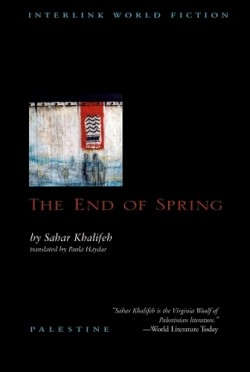End of Spring
In The End of Spring by Sahar Khalifeh, (Interlink Books, 978-1-56656-681-0) love is the same creature in a different land. “Religion is history,” says Rachel, an English protester, to Ahmad, who lives in Palestine and works with the emergency services in his own meager attempt to staunch the flow of blood among his people. But for the Arab characters in the novel, history is very much a part of the present; religion and faith are the structures against which they measure everything in their lives: their work, their families, their love.
Ahmad and his half-brother, Majid, come to the revolution by accident. Ahmad, a dreamy boy who excels at art, is caught trying to release his beloved cat from a cage at a Jewish veterinarian’s and is mistaken for a terrorist. After being tortured, he is released with new ideas on where life may lead him. Brother Majid flees his rented room when he fears he will be accused of murdering his benefactor; a carload of revolutionaries picks him up and “just like that Majid became a fugi-tive in the hands of a band of revolutionaries and just like that a new page was opened in the life of the young musician. He put down his guitar and picked up a machine gun.”
Life as a revolutionary during the siege of Nablus is a hard one. Starvation, dehydration, wounds, death, and the mental deterioration that comes from the constant stress of imminent attack work under the skin of the brothers and their fellow soldiers. The boys’ love for each other, their family, and certain women can become either a saving grace or turn brittle under the stress.
Khalifeh offers a Jerusalem beyond that which is delivered to foreign audiences through television and newspapers. She gives us humans with their own emotions and reasons, characters we want to help, people for whom we want to stop the tanks, bulldozers, and bombs. When Ahmad crosses an emotional barrier and becomes a flaming icon, instead of routine disgust and hateful despair, readers may want to flip back pages of time and smooth the hair on his young head, easing the burden he carries—the burden of too much love.
Disclosure: This article is not an endorsement, but a review. The publisher of this book provided free copies of the book to have their book reviewed by a professional reviewer. No fee was paid by the publisher for this review. Foreword Reviews only recommends books that we love. Foreword Magazine, Inc. is disclosing this in accordance with the Federal Trade Commission’s 16 CFR, Part 255.

